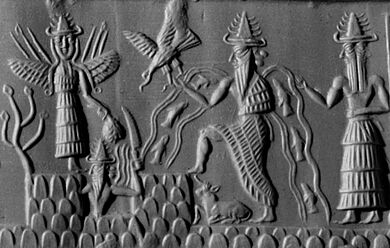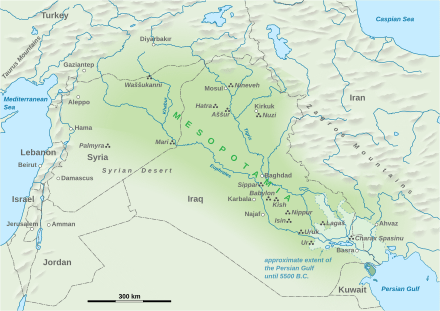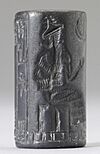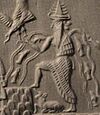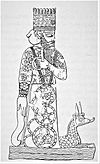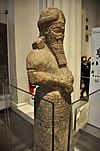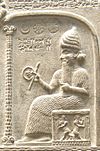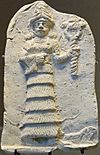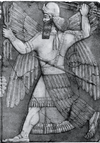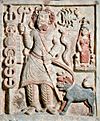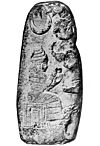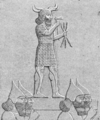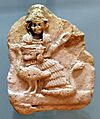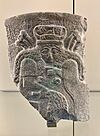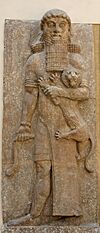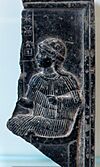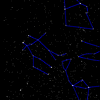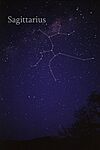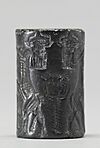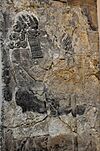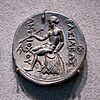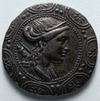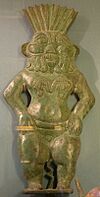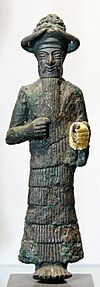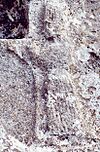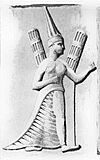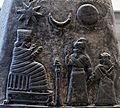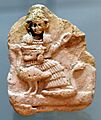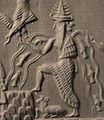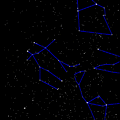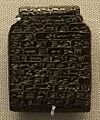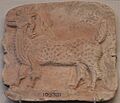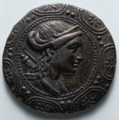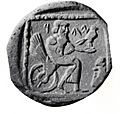List of Mesopotamian deities facts for kids
The gods and goddesses in ancient Mesopotamia were mostly imagined as looking like humans. People believed they had amazing powers and were often huge in size. These deities usually wore something called melam, which was a special, glowing substance that made them look terrifyingly grand. Even heroes, kings, giants, and demons could sometimes wear melam. When a human saw a god's melam, it caused a feeling called ni, which was like a physical shiver or creeping of the skin. Both the Sumerian and Akkadian languages had many words to describe this feeling, including puluhtu, meaning "fear." The gods were almost always shown wearing special caps with up to seven pairs of ox-horns stacked on top of each other. Sometimes, they also wore fancy clothes decorated with gold and silver.
People in ancient Mesopotamia believed their gods lived in Heaven. However, they also thought that a god's statue was a real, physical form of the god itself. Because of this, these statues were cared for constantly by priests. The priests would dress the statues and place food in front of them, so the gods could "eat." A god's temple was seen as the god's actual home. The gods also had large barges, which were usually kept in their temples. These boats were used to carry the gods' statues along rivers during different religious festivals. They also had chariots for moving their statues on land. Sometimes, a god's statue would even be taken to a battle, so the god could watch the fight. The most important gods were believed to meet in an "assembly of the gods," where they made all their decisions. This assembly was like a divine version of the early democratic system that existed during the Third Dynasty of Ur (around 2112 BC – 2004 BC).
The group of Mesopotamian gods changed a lot over time. Generally, the history of their religion can be split into four periods. In the first period (starting in the 4th millennium BC), gods mainly focused on basic human needs like food and water. In the second period (3rd millennium BC), the gods' hierarchy became more organized, and even kings who were seen as gods joined the group. During the third period (2nd millennium BC), gods worshipped by individuals and common people became more important. In the final period (1st millennium BC), gods became closely linked to specific human empires and rulers. We have found the names of over 3,000 Mesopotamian gods in ancient texts. Many of these come from long lists of gods created by ancient scribes. The longest list is called An = Anum, a Babylonian text that names over 2,000 deities. This list wasn't just about Sumerian gods and their Akkadian versions. It also explained how gods were related and what their jobs were. It even listed their spouses, children, and servants.
Different names were used to describe groups of gods. The term Anunnaki first appeared around the time of Gudea (around 2144 – 2124 BC) and the Third Dynasty of Ur. This term usually referred to the main gods of heaven and earth, who had huge powers and were believed to "decide the fates of people." Gudea called them the "Lamma (guardian gods) of all countries." Another similar term for gods was Igigi, first seen during the Old Babylonian Period (around 1830 BC – 1531 BC). The name Igigi seems to have originally meant the "great gods," but later it referred to all the gods of Heaven. Sometimes, Anunnaki and Igigi were used to mean the same thing.
Contents
Main Gods of Mesopotamia
In 1963, scholar Samuel Noah Kramer said that the three most important gods in Mesopotamia were An, Enlil, and Enki. However, newer research shows that the most important gods could change depending on the time and place. For example, in Uruk, Inanna was the most important god. In the first millennium BCE, Marduk became the supreme god in Babylonia. In Assyria, Assur was seen as the most powerful god.
The number seven was very important in ancient Mesopotamian beliefs about the universe.
In Sumerian religion, the most powerful gods were sometimes called the "seven gods who decree": An, Enlil, Enki, Ninhursag, Nanna, Utu, and Inanna.
Many major Sumerian gods were linked to specific planets or stars: Inanna was the planet Venus, Utu was the Sun, and Nanna was the Moon.
| Name | Image | Main Worship Places | Celestial Body | Details |
|---|---|---|---|---|
| An Anu |
Eanna temple in Uruk | Equatorial sky | An (Sumerian), later Anu (Akkadian), was the supreme god and the "first creator," representing the sky. He was seen as the most ancient ancestor. In some beliefs, all gods were children of An and his partner Ki. However, An himself was sometimes described as a descendant of older beings. While An was the highest god, Enlil was usually the main god worshipped. | |
| Enlil Nunamnir, Ellil |
Ekur temple in Nippur | Northern sky | Enlil, later Ellil, was the god of wind, air, earth, and storms, and the chief of all gods. Sumerians saw him as a kind, fatherly god who looked after humans. One hymn says he was so glorious that other gods couldn't even look at him. His worship was strongly connected to the city of Nippur. After Nippur was attacked in 1230 BC, his worship declined. Later, Marduk (Babylonian god) and Assur (Assyrian god) took over his role as chief deity. | |
| Enki Nudimmud, Ninshiku, Ea |
E-Abzu temple in Eridu | Southern sky | Enki, later Ea, was the god of the underground freshwater ocean. He was also linked to wisdom, magic, arts, and crafts. He was either the son of An or the goddess Nammu. His wife was Damgalnuna (Ninhursag). Enki was a helper of humanity, even saving humans during the Great Flood. He was believed to organize the civilized world and hold the sacred mes, which were tablets containing all aspects of human life. | |
| Marduk | Babylon | Jupiter | Marduk was the main god of the Babylonians. As Babylon grew in power, so did his worship. He eventually became as important as Enlil. Some later texts even say that Marduk was the supreme god. His wife was the goddess Sarpānītu. | |
| Ashur | Assur | Ashur was the main god of the Assyrians. He might have started as the god of the city of Assur itself. At first, he had no family among the gods. Later, he was linked with Enlil, and sometimes Ninlil was seen as his wife. As the Assyrian Empire grew, his worship spread. In Assyrian texts, "Bel" was a title for Ashur, not Marduk. | ||
| Nabu | Borsippa, Kalhu | Mercury | Nabu was the Mesopotamian god of scribes and writing. His wife was Tashmetu. He later became linked to wisdom and farming. In the first millennium BCE, he became one of the most important gods in Babylonia. In Assyria, his importance grew in the 8th and 7th centuries BCE. Some kings even put Nabu's status equal to or above Marduk's. His worship also spread outside Mesopotamia. | |
| Nanna Enzu, Zuen, Suen, Sin |
E-kiš-nu-ğal temple in Ur and another temple in Harran | Moon | Nanna (Sumerian), later Sin (Akkadian), was the ancient Mesopotamian god of the Moon. He was the son of Enlil and Ninlil. In some beliefs, Nanna was the king of the gods, with Anu, Enlil, Enki, and Ninhursag as his advisors. | |
| Utu Shamash |
E-Babbar temples at Sippar and Larsa | Sun | Utu (Sumerian), later Shamash (Akkadian), was the ancient Mesopotamian god of the Sun. He was also the god of truth, justice, and fairness. He was the son of Nanna and the twin brother of Inanna. Utu was believed to see everything that happened during the day and to help people in trouble. Along with Inanna, Utu made sure divine justice was carried out. | |
| Inanna Ishtar |
Eanna temple in Uruk, also in Nippur, Lagash, Shuruppak, Zabalam, and Ur | Venus | Inanna (Sumerian), later Ishtar (Akkadian), was "the most important female god of ancient Mesopotamia." She was the Sumerian goddess of love and war. She was the planet Venus, the morning and evening star. Her parents varied in myths, but she was often the daughter of Nanna and Ningal. Many myths about her involve her trying to take control of other gods' areas. Her most famous myth is her descent into the Underworld, where she tries to conquer the realm of her older sister Ereshkigal. | |
| Ninhursag Damgalnuna, Ninmah |
E-Mah temple in Adab, Kesh | Ninhursag ("Mistress of the mountain ranges") was the Mesopotamian mother goddess. Her main jobs were related to birth and creation. She was the wife of Enki, though in some places her husband was Šulpae. Some rulers even claimed her as their divine mother. | ||
| Ninurta Ninĝírsu |
E-šu-me-ša temple in Nippur, Girsu, Lagash, and later Kalhu in Assyria | Saturn | Ninurta, also known as Ningirsu, was a Mesopotamian warrior god worshipped from very early times. He was the gods' champion against the Anzû bird, which stole the Tablet of Destinies from his father Enlil. Ninurta was also a farming god and the protector of farmers. In one epic poem, he defeats the demon Asag and uses stones to build the Tigris and Euphrates rivers for irrigation. | |
| Nergal | E-Meslam temple in Kutha and Mashkan-shapir | Mars | Nergal was linked to the Underworld and was usually the husband of Ereshkigal. He was also connected to forest fires, fevers, plagues, and war. In myths, he caused destruction. In later periods, Nergal was often listed right after the supreme gods Marduk and Nabu in official documents. | |
| Dumuzid Tammuz |
Bad-tibira and Kuara | Dumuzid, later called Tammuz, was the ancient Mesopotamian god of shepherds and the main partner of Inanna. His sister was Geshtinanna. Besides shepherds, Dumuzid was also a farming god linked to plant growth. People associated him with springtime, when the land was fertile. But in summer, when the land was dry, it was believed Dumuzid had "died." During the month of Dumuzid (mid-summer), people across Sumer would mourn his death. | ||
| Ereshkigal | Kutha | Hydra | Ereshkigal was the queen of the Mesopotamian Underworld. She lived in a palace called Ganzir. In early stories, her husband was Gugalanna, but later the northern god Nergal took this role. Her gatekeeper was Neti. In the poem Inanna's Descent into the Underworld, Ereshkigal is described as Inanna's "older sister." | |
| Gula and Ninisina, Nintinugga, Ninkarrak |
E-gal-mah temple in Isin and other temples in Nippur, Borsippa, Assur, Sippar, Umma | Healing goddesses were very important in Mesopotamia, seen as divine protectors of doctors. Many such goddesses existed, like Nintinugga, Ninisina, and Ninkarrak. Eventually, Gula became the most important healing goddess, and others were sometimes combined with her. Dogs were often linked to healing goddesses, and Gula is often shown with a dog. | ||
| Bau | Lagash, Kish | Bau was an important goddess of Lagash. Some kings saw her as their divine mother. She was also a healing goddess. She was the wife of Ningirsu and became very important in the 3rd millennium BCE. During the Third Dynasty of Ur, she was the second most notable "divine wife" after Ninlil. Even after Lagash declined, she remained important in Kish. | ||
| Ishkur Adad, Hadad |
Karkar, Assur, Kurba'il | Ishkur (Sumerian), later Adad or Hadad (Akkadian), was the Mesopotamian god of storms and rain. In northern Mesopotamia, where rain was crucial for farming, he was very prominent. He was seen as the son of An. His wife was Shala. Besides being a weather god, Hadad was also a god of law and a guardian of oaths. | ||
| Nanaya | Uruk and Kish | Corona Borealis | Nanaya was a goddess of love. She was often called upon in love spells. Her worship was widespread. She was also involved in helping people and was seen as a "lady of lamma," a type of minor protective goddess who could speak to higher gods for humans. She was closely linked to Inanna/Ishtar but was a separate goddess. | |
| Nanshe | Lagash | Nanshe was a goddess linked to the city of Lagash. She was a daughter of Enki and sister of Ningirsu. She was connected to divination and dream interpretation. She was also believed to help the poor and ensure fair weights and measures. She was associated with fish and waterfowl. | ||
| Ninlil | Nippur, Assur, Kish, Ḫursaĝkalama | Ninlil was the wife of Enlil, the ruler of the gods. She was not linked to any specific city of her own, mainly serving as Enlil's partner. She was still seen as having power equal to Enlil's. In one poem, Ninlil declares, "As Enlil is your master, so am I also my mistress!" | ||
| Ninshubur | Akkil; worshipped with Inanna as her sukkal | Orion | Ninshubur was the most commonly worshipped sukkal (a type of divine assistant). Her mistress was Inanna. Texts show they were very close. Ninshubur was seen as able to "calm" Inanna and was "unshakably loyal." In one myth, she saves Inanna from monsters. She was also a wise advisor to gods and human rulers. | |
| Nisaba | Eresh, later Nippur | Nisaba was originally a goddess of grain and farming. But, starting in the Early Dynastic Period, she became a goddess of writing, accounting, and scribal knowledge. Her main city, Eresh, was important early on. She was the mother of the goddess Sud, who was linked with Enlil's wife Ninlil. | ||
| Zababa | Kish | Zababa was a war god who was the protector of Kish. His main temple was E-mete-ursag. He was first mentioned in the Early Dynastic Period. During the time of kings like Hammurabi, Zababa was seen as the main war god, even more so than Ninurta. His main symbol was a staff with an eagle's head. |
Ancient Creator Beings
Different civilizations in Mesopotamia had many different creation stories. The earliest stories were simple Sumerian tales from the late 3rd millennium BC. These were often short introductions to longer myths. Later stories became much more detailed, adding many generations of gods and ancient beings. The longest and most famous is the Babylonian Enûma Eliš, or Epic of Creation, which has seven tablets. This epic was written no earlier than the late 2nd millennium BC, but it used older stories. These ancient beings were generally seen as very old and no longer active, unlike the regular gods.
| Name | Image | Details |
|---|---|---|
| Abzu | In the Babylonian creation story, the Enûma Eliš, Abzu was the first, undefined being. He was the partner of the goddess Tiamat and was later killed by the god Ea (Enki). Abzu was the spirit of the underground primeval waters. | |
| Anshar and Kishar | In some myths, Anshar and Kishar were a very old couple, male and female. In the Babylonian Enûma Eliš, they were the second pair of children born from Abzu and Tiamat, and they were the parents of the supreme god An. | |
| Enki and Ninki | Enki and Ninki were two ancient beings seen as the first generation of ancestors of Enlil. They were followed by other pairs of gods whose names started with "En" and "Nin." These pairs appear as Enlil's ancestors in various texts. The oldest document with this tradition is the Fara god list. | |
| Nammu | Nammu was the ancient goddess who, in some Sumerian stories, was said to have given birth to both An and Ki. She later became known as the mother of Enki and was respected as an important mother goddess. She was likely the spirit of the underground primeval waters. | |
| Tiamat | In the Babylonian creation story, the Enûma Eliš, Tiamat and her partner Abzu were the only gods at first. They had children, who became the first generation of gods. After Ea (Enki) killed Abzu, Tiamat gave birth to eleven monsters to get revenge. Eventually, Marduk, Enki's son, killed Tiamat and used her body to create the earth. In the Assyrian version, Ashur killed Tiamat. Tiamat was the spirit of the primeval waters. |
Other Gods and Spirits
| Name | Image | Main Worship Places | Details |
|---|---|---|---|
| Aya Sherida, Nin-Aya |
Sippar and Larsa | Sherida (Sumerian) or Aya (Akkadian) was the wife of the sun god Utu/Shamash and the goddess of dawn. Her most common title was kallatum, meaning "bride" or "daughter-in-law." She was especially popular during the Old Babylonian and Neo-Babylonian periods. | |
| Bilgames Gilgamesh |
Uruk, a small village near Ur, Lagash, Girsu, Der, Nippur | Most historians agree that Gilgamesh was a real king of Uruk, probably around 2900–2350 BC. Later, he was worshipped as a god. Kings of the Third Dynasty of Ur called him their "divine brother" and "friend." Many myths and legends grew around him. The Epic of Gilgamesh describes him as "one-third human, two-thirds divine." | |
| Geshtinanna | Nippur, Isin, and Uruk | Geshtinanna was a farming goddess sometimes linked to dream interpretation. She was the sister of Dumuzid. In one myth, she protects her brother from demons. In another myth about Dumuzid's death, Inanna decides that Dumuzid and Geshtinanna will take turns in the Underworld, each spending half the year there. When she is in the Underworld, Geshtinanna works as Ereshkigal's scribe. | |
| Gibil | Gibil was the god of fire. He represented fire in all its forms: destructive (like summer heat) and creative (like the fire in a blacksmith's furnace). He was traditionally the son of An and Shala, or sometimes Nusku. | ||
| Isimud | Worshipped with Enki as his sukkal | Isimud, later Usmû, was Enki's personal assistant. His name is related to "having two faces," and he is shown in art with a face on each side of his head. He acted as Enki's messenger in myths like Enki and Ninhursag. | |
| Ki | Umma, Lagash | Ki was a Sumerian goddess who was the spirit of the earth. In some Sumerian stories, she was an ancient being who, with An, created many plants. An and Ki were worshipped together in Umma and Lagash. | |
| Lugalbanda | Uruk, Nippur, and Kuara | Lugalbanda was an early legendary king of Uruk, who later became a god. He was the husband of Ninsun and the father of the hero Gilgamesh. He was mentioned as a god as early as the Early Dynastic Period. Kings of the Third Dynasty of Ur offered sacrifices to him. | |
| Lugal-irra and Meslamta-ea | Kisiga | Lugal-irra and Meslamta-ea were twin gods worshipped in Kisiga. They were seen as guardians of doorways. They might have originally been twins guarding the Underworld gates. In the Neo-Assyrian period, small statues of them were buried at entrances for protection. They are linked to the constellation Gemini. | |
| Nusku | Nippur, Harran | Nusku was the god of fire and light. He was the son and minister of Enlil. The god Gibil was sometimes described as his son. Nusku's main symbol was a lit oil lamp. He was worshipped in Harran by people who spoke Old Aramaic. | |
| Pabilsaĝ | Isin, Nippur, and Larag | Pabilshag was a god worshipped from the Early Dynastic Period onwards. He was believed to be the son of Enlil and the husband of Ninisina. In some texts, he was identified with Ninurta. One Sumerian poem describes his journey to Nippur. Pabilshag was believed to be the constellation Sagittarius. | |
| Shala Medimsha |
Karkar | Shala, also known as Medimsha, was the wife of the weather god Adad. She was a goddess of rain and was often shown on cylinder seals. | |
| Shara | Umma, possibly Tell Agrab | Shara was a local god linked to the city of Umma. He was also a warrior god and called a "hero of An." In one myth, Shara is one of the gods who greets Inanna when she returns from the Underworld. | |
| Tashmetu | Kalhu | In Assyrian mythology, Tashmetu was the divine partner of Nabu, the god of scribes and wisdom. In Babylonian mythology, Nanaya held this role. Tashmetu was linked to wisdom and attractiveness. A poem describes how Nabu and Tashmetu's statues would be brought together for a "marriage ceremony." |
Monsters and Protective Spirits
Mesopotamian mythology featured many strange and powerful creatures, some of which were seen as dangerous, while others were believed to offer protection.
| Name | Image | Associated god(s) | Details |
|---|---|---|---|
| Anzû Imdugud |
Ninurta | Imdugud, later Anzû, was a huge bird-like monster with a lion's head. Its wing flaps were thought to cause sandstorms. In Sumerian myth, Imdugud stole the sacred mes (tablets of civilization) from Enki. In Akkadian myth, it stole the Tablet of Destinies from Enlil. In both stories, Ninurta defeated it and returned the stolen items. | |
| Bull of Heaven | The Bull of Heaven was a mythical beast that Ishtar demanded from her father Anu in the Epic of Gilgamesh. Anu gave it to her, and she unleashed it, causing great destruction. Gilgamesh and Enkidu eventually killed the bull. The Bull of Heaven is identified with the constellation Taurus. | ||
| Girtablullu | Utu/Shamash | Girtablullu were creatures with a human upper body and a scorpion lower body. They were believed to serve the sun god Utu/Shamash. In the Epic of Gilgamesh, a scorpion-man and scorpion-woman guard the gate where the sun rises and sets. | |
| Humbaba Huwawa |
Humbaba was a monster living in the Cedar Forest, defeated by Gilgamesh and Enkidu in the Epic of Gilgamesh. Sculptures of Humbaba's head were used for protection in temples. His face was often compared to the insides of sacrificed animals in omen texts. | ||
| Lahmu | Enki/Ea; Marduk | Lahmu was a type of protective creature. He was originally linked to Enki and later to Marduk. On cylinder seals, Lahmu was sometimes shown as a fisherman. During the Neo-Assyrian Period, small figures of Lahmu were placed under house foundations to protect against demons and sickness. | |
| Lamashtu | Lamashtu was a goddess with a "lion's head, donkey's teeth, a hairy body, and bird-like claws." She was believed to feed on the blood of baby humans and was blamed for miscarriages and sudden infant deaths. Although often called a demon, she was likely seen as a goddess because she could cause evil on her own. People used amulets to protect against her. | ||
| Mušḫuššu | Ninazu, Ningishzida; Tishpak; Marduk, Nabu; Ashur | Mušḫuššu ("furious snake") was a dragon-like creature, often shown as a lion-dragon mix. It was depicted as a servant of various gods. It was originally linked to Ninazu and Ningishzida. Later, Marduk and Nabu were associated with it. The use of its images for protection was likely because it was seen as a fearless protector of its gods. | |
| Pazuzu | Pazuzu was a demonic god known to Babylonians and Assyrians. He is shown with a "dog-like face, bulging eyes, a scaly body, bird talons, and wings." He was believed to be the son of the god Hanbi. He was a helpful spirit who protected against disease-carrying winds and could force Lamashtu back to the Underworld. Amulets with his image were used to protect babies and pregnant women. |
Gods from Other Lands
Mesopotamia was a crossroads of ancient civilizations, and its people sometimes adopted or interacted with gods from other cultures.
| Name | Image | Place of origin | Details |
|---|---|---|---|
| Apollo | Greece | The Greek Seleucid kings favored Apollo and brought his worship to Mesopotamia. Here, Apollo was sometimes linked with Nabu. Greek-speaking communities built temples to Apollo. | |
| Artemis | Greece | In Mesopotamia and Syria, Artemis was identified with the goddess Nanaya. This link gave Nanaya new associations with the moon and archery. | |
| Ashratum | Amorite areas | Ashratum was an Amorite goddess who became linked with Amurru in Mesopotamia. They were seen as a couple and shared a connection to mountains and steppes. | |
| Bes | Egypt | Bes was the Egyptian god of play. He was a "full-faced, dwarf with an oversized head and feathered crown." Similar dwarf-god figures became common across the Near East. Bes seems to be the only Egyptian god widely worshipped in Mesopotamia, mostly as a protective spirit. | |
| Dagan | Tuttul and Terqa | Dagan was the main god of the middle Euphrates area, seen as a god of prosperity and "father of gods." He was important internationally even in the Ebla period. He was partly combined with Enlil due to their similar roles. | |
| Herakles | Greece | In Mesopotamia, the worship of Herakles was combined with that of Nergal and the Persian god Verethragna. He served a protective role. | |
| Inshushinak | Elam, especially Susa | Inshushinak was a main Elamite god. He was linked to kingship and the underworld, and was the protector god of Susa. In some Mesopotamian texts, he appears as an underworld god. | |
| Ishara | Ebla, Hurrian areas | An Eblaite goddess who came to Mesopotamia. She shared temples with other western gods. She became a love goddess, linked to marriage, due to her association with Ishtar. | |
| Shaushka | Nineveh, Nuzi and other Hurrian centers | Shaushka was a Hurrian goddess seen as similar to Ishtar ("Ishtar of Subartu" or "Ishtar of Nineveh"). Her worship influenced the later Assyrian Ishtar of Nineveh. | |
| Tishpak | Eshnunna | Tishpak was a god who replaced Ninazu as the protector god of Eshnunna. He shared most of Ninazu's jobs and symbols. He had foreign roots, possibly Elamite. | |
| Yahweh El, Elohim, El Shaddai, Yah |
Kingdoms of Israel and Judah | Yahweh was the main god of the Israelites. After the Babylonian king Nebuchadnezzar captured Jerusalem in 586 BC, many Judahites were sent to Babylon. During this time, some Jewish priests in Babylon likely edited and wrote parts of their holy texts. The works of Second Isaiah, also written in Babylon, were the first clear statements that only Yahweh was the supreme God. |
Images for kids
See also
- List of Elamite deities
- List of Hittite deities
- List of Hurrian deities
- List of sukkals
- An = Anum


